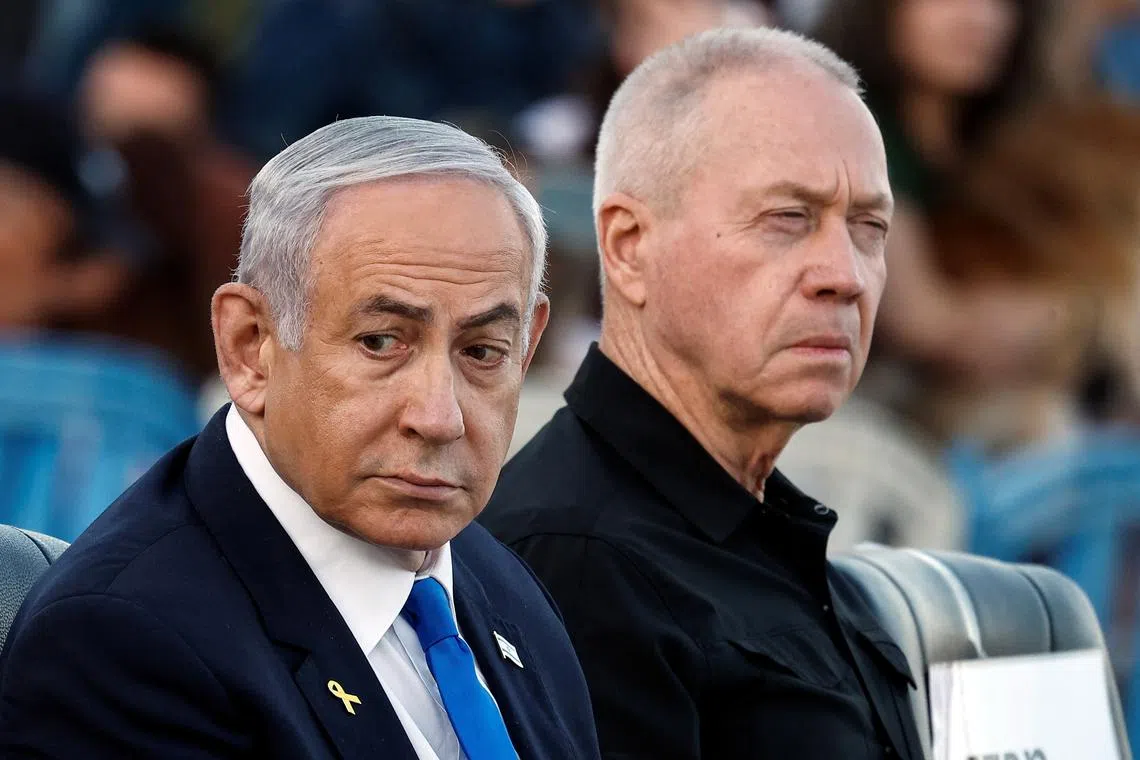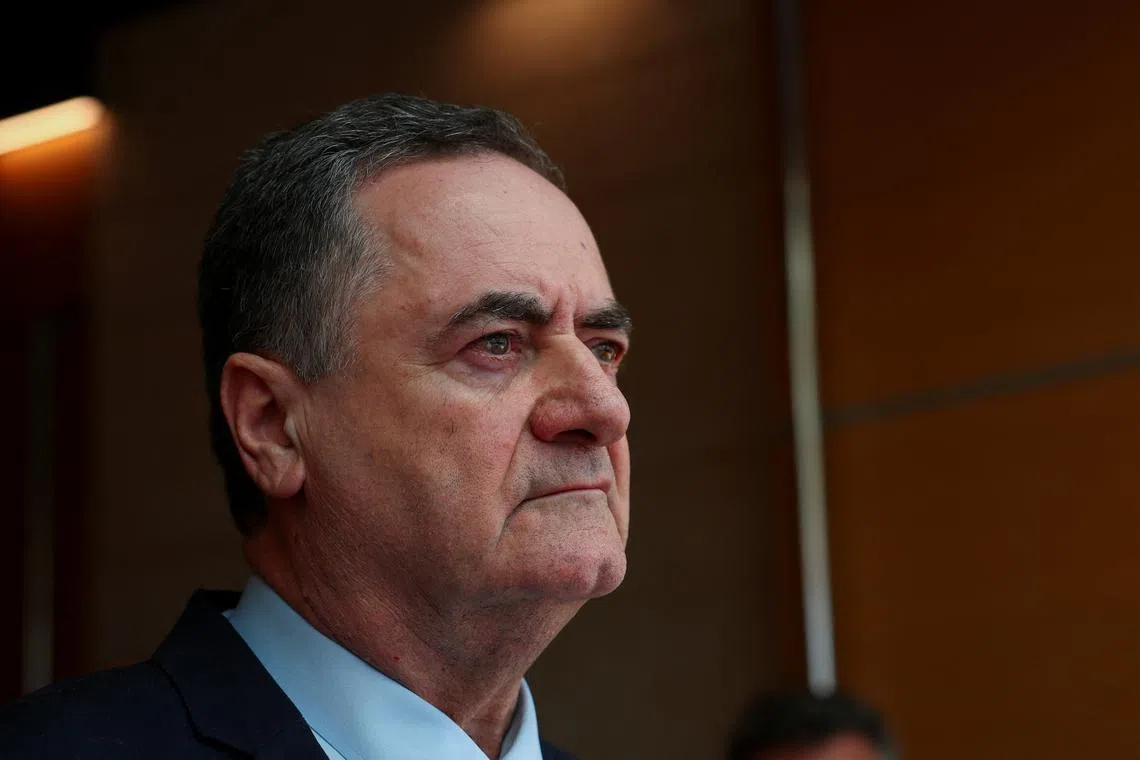Netanyahu fires defence minister Gallant, jolting Israeli politics as war grinds on
Sign up now: Get ST's newsletters delivered to your inbox

Israeli Prime Minister Benjamin Netanyahu (left) and Defence Minister Yoav Gallant clashed for months over the objectives of Israel's war in Gaza.
PHOTO: REUTERS
Follow topic:
JERUSALEM - Israeli Prime Minister Benjamin Netanyahu fired Defence Minister Yoav Gallant on Nov 5, citing a “crisis of trust”, and replaced him with close ally Israel Katz
Mr Netanyahu’s critics accused him of putting politics ahead of national security at a time when Israel is bracing for Iranian retaliation to its Oct 26 air strikes on the Islamic Republic.
After Mr Gallant was fired, protesters in Israel blocked highways and lit bonfires on roads, police said.
The Prime Minister named Mr Gideon Saar as the new foreign minister in place of Mr Katz.
Mr Gallant and Mr Netanyahu, both in the right-wing Likud party, have clashed for months over the objectives of Israel’s 13-month-old war in Gaza against Palestinian militant group Hamas. But the timing of Mr Gallant’s dismissal was a surprise, and came as Israel’s ally the US held its presidential election.
Israel’s campaigns in Gaza and Lebanon have entered new phases following the killing of top commanders in both Hamas and Lebanese armed group Hezbollah.
Mr Netanyahu said Mr Gallant has made statements that “contradict the decisions of the government and the decisions of the Cabinet”. In response, Mr Gallant said: “The security of the state of Israel always was and will always remain my life’s mission.”

Israeli Foreign Minister Israel Katz will succeed Mr Gallant as defence minister.
PHOTO: REUTERS
Mr Katz vowed the return of Israel’s hostages from Gaza and destruction of Hamas and Hezbollah.
“I accept this responsibility with a sense of mission and holy fear for the security of the State of Israel and its citizens,” Mr Katz said on social media platform X.
As foreign minister, Mr Katz barred UN Secretary-General Antonio Guterres in October from entering Israel over what he described as a failure to condemn an Iranian missile attack and antisemitic and anti-Israel conduct. In September, he rejected proposals from the US and France for a 21-day ceasefire in Lebanon.
Reports appeared in September that Mr Netanyahu, under pressure from far-right coalition partners, was considering firing Mr Gallant.
Dr Gayil Talshir, a specialist in Israeli politics at the Hebrew University of Jerusalem, believed the last straw for Mr Netanyahu came this week when Mr Gallant issued 7,000 draft notices for ultra-Orthodox Haredi men, angering those in the government who oppose conscription.
Mr Itamar Ben-Gvir, a minister in Mr Netanyahu’s coalition government, praised the Nov 5 decision, saying Mr Gallant was “deeply trapped in the conception” that it “is not possible to achieve absolute victory”.
Israeli opposition leader Yair Lapid said on X, however, that “firing Gallant in the middle of a war is an act of madness”.
In Washington, a spokesperson for the White House National Security Council said Mr Gallant had been an important partner and that it would continue working collaboratively with Mr Katz.
Mr Gallant rose to the rank of general during a 35-year military career.
France’s Foreign Minister Jean-Noel Barrot will travel to Israel and the Palestinian territories on Nov 6, a day after the US elections, to press Israel to engage diplomatically to end the conflicts in Gaza and Lebanon.
Northern Gaza airstrikes
Earlier on Nov 5, Israeli forces issued new evacuation orders in the northern Gaza Strip and carried out military strikes which Palestinian medics and media said had killed at least 35 people since the night of Nov 4.
Acting UN aid chief Joyce Msuya said on X that Israeli military ground operations in northern Gaza had left Palestinians “without the essentials to survive, forced them to flee for safety multiple times, and cut off their escape and supply routes.”
An airstrike late on Nov 4 damaged two houses in the town of Beit Lahiya, killing at least 20 people, the Palestinian official news agency WAFA and Hamas media said.
Ten were killed in central areas of the Palestinian enclave - six in separate airstrikes on Gaza City and the town of Deir Al-Balah, and four in the town of Al-Zawayda around midnight on Nov 4, medics and health officials said.
At least five others were killed in an Israeli strike on a house in Jabalia north of Gaza City, medics said later on Nov 5.
The Israeli military said, without giving details, that its forces had “eliminated terrorists” in the central Gaza Strip and Jabalia area. Israeli troops had also located weapons and explosives over the past day in the southern Rafah area, where “terrorist infrastructure sites” had been eliminated, it said.
Later on Nov 5, Israeli planes dropped leaflets over Beit Lahiya ordering residents who have not yet left their homes and shelters housing displaced families to quit the town completely.
“To all those who remained at homes and shelters, you are risking your lives. For your safety you have to head south,” said the leaflet, which was written in Arabic.
Palestinians said the new attacks and Israeli orders for evacuations were aimed at emptying areas to create buffer zones.
Israel says the evacuations are meant to keep civilians out of harm’s way as its troops battle Hamas fighters.
More than 43,300 Palestinians have been killed in more than a year of war in Gaza, health authorities in Gaza say.
The war began after Hamas-led militants attacked Israel on Oct. 7, 2023, killing about 1,200 people and taking 251 hostages to Gaza, according to Israeli tallies. REUTERS

